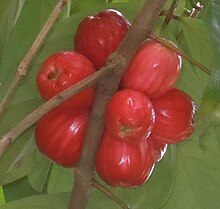Syzygium malaccense
| Malay (rose) apple | |
|---|---|
 |
|
|
Rare (NCA)
|
|
| Scientific classification | |
| Kingdom: | Plantae |
| (unranked): | Angiosperms |
| (unranked): | Eudicots |
| (unranked): | Rosids |
| Order: | Myrtales |
| Family: | Myrtaceae |
| Genus: | Syzygium |
| Species: | S. malaccense |
| Binomial name | |
|
Syzygium malaccense (L.) Merr. & , 1938 |
|
| Synonyms | |
|
Caryophyllus malaccensis (L.) Stokes |
|
Caryophyllus malaccensis (L.) Stokes
Eugenia malaccensis L.
Syzygium malaccense is a species of flowering tree native to Malaysia,Indonesia (Sumatra and Java)Vietnam, Thailand, New Guinea and Australia. It has been introduced throughout the tropics, including many Caribbean countries and territories such as Jamaica where it is known simply as "Jamaican apple" or the more common Otaheite apple.
Syzygium malaccense has a number of English common names. It is known as a Malay rose apple, or simply Malay apple, mountain apple, rose apple, Otaheite apple, pink satin-ash and pommerac (derived from pomme Malac, meaning "Malayan apple" in French). Despite the fact that it is sometimes called the otaheite cashew, it is not related to cashew. While cashew nuts (but not cashew fruits) may trigger allergic reactions, rose apple fruit has not been observed to do so.
The combination of tree, flowers and fruit has been praised as the most beautiful of the Syzygium family. The fruit is oblong-shaped and dark red in color, although some varieties have white or pink skins. The flesh is white and surrounds a large seed. Its taste is bland but refreshing. Jam is prepared by stewing the flesh with brown sugar and ginger.
Malay apple is a strictly tropical tree and will be damaged by freezing temperatures. It thrives in humid climates with an annual rainfall of 152 cm (60 in) or more. It can grow at a variety of altitudes, from sea level up to 2,740 m (8,990 ft). The tree can grow to 12–18 m (39–59 ft) in height. It flowers in early summer, bearing fruit three months afterward. In Costa Rica, it flowers earlier, with ripe fruit in April. Coffee growers use the species to divert birds.
...
Wikipedia
